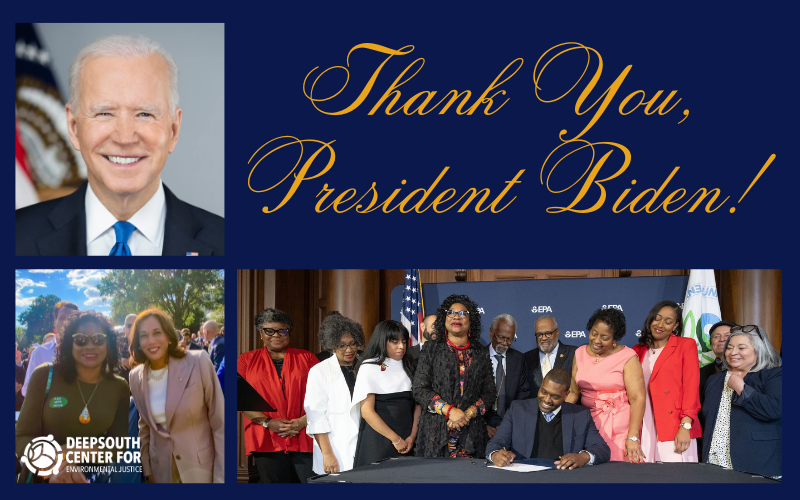
Jul 22, 2024 | Dr. Beverly Wright News, DSCEJ General News, The Latest News
July 22, 2024 –
Following the recent announcement that President Joe Biden has ended his campaign for re-election, Dr. Beverly Wright, Founder and Executive Director of the Deep South Center for Environmental Justice (DSCEJ), released the following statement:
The DSCEJ expresses its heartfelt gratitude to the continuing work of President Joe Biden and his unprecedented commitment to environmental justice and climate action. No administration in history has done more than President Biden’s to ensure that all people—regardless of race, income, or ZIP code—live in healthy, safe and sustainable communities.
President Biden is the first U.S. President to call-out “Cancer Alley” from day one of his term, and directed the US Environmental Protection Agency to take action that includes holding industries accountable for endangering the health of residents and requiring them to lower pollution to significantly reduce cancer risks.
In August 2022, President Biden signed the Inflation Reduction Act (IRA) into law, delivering historic investments to support the most ambitious climate and clean energy plan in U.S. history. The IRA invested roughly $55 billion to reduce local pollution, as well as improve public health and economic security in Black, Brown, Indigenous, Asian and Pacific Islander, and low-income communities.
Additionally, President Biden signed into law the Infrastructure Investment and Jobs Act (IIJA), which provides $93 billion for pollution cleanup and lead pipe removal. This combined funding supports the Justice40 Initiative, which aims to deliver at least 40 percent of federal climate, clean energy, and other infrastructure investment benefits from more than 500 federal programs to low-income communities and communities of color. This Biden-Harris policy led the DSCEJ to launch its Justice40 Community Engagement Project to build the capacity of communities through education and training. We were able to directly impact 240 Hub Leaders and Hub Members of community-based organizations throughout the United States.
Thank you President Biden for your unwavering and continuing commitment to the environmental health of our communities, our nation and our world. We look forward to a future with VP Kamala Harris’ leadership in carrying the torch to advance Environmental Justice.
About the Deep South Center for Environmental Justice: Families in the Gulf Coast deserve to live in communities that are free from deadly air and are more resilient to climate change and extreme weather. The Deep South Center for Environmental Justice (DSCEJ) works to empower and engage communities to put environmental justice and equity at the center of all climate action. Led by environmental justice scholar and advocate, author, civic leader and professor of Sociology Dr. Beverly L. Wright, the DSCEJ uses research, education, and community and student engagement to advocate for policy change, lead health and safety training for environmental careers, develop social and emotional community wellness programs, and create new and environmentally healthy opportunities for the residents of communities disproportionately impacted by historic environmental injustice.
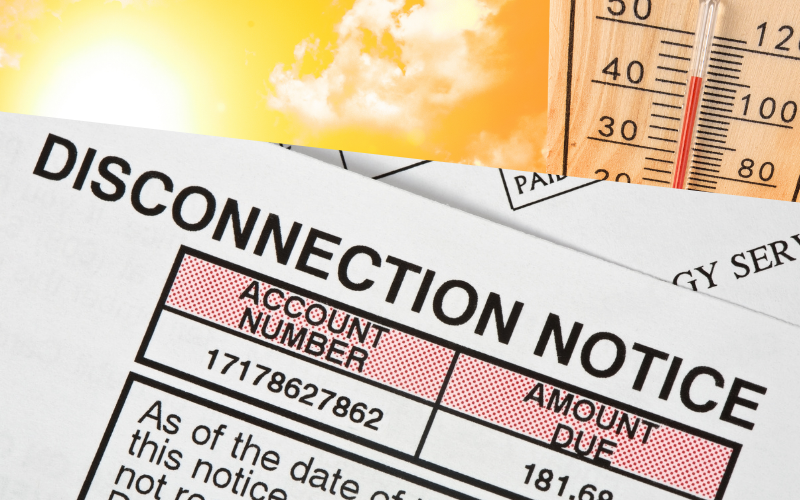
Jul 10, 2024 | DSCEJ General News, Research and Policy News, The Latest News
July 10, 2024 – The Energy Future New Orleans Coalition (EFNO) has sent a letter to the New Orleans City Council calling upon the Council to address the utility debt crisis that has left New Orleanians powerless. Through the discovery process under docket UD-23-02, we have learned that Entergy New Orleans’ (ENO) residential disconnection rate for 2023 was 19%, meaning nearly one out of every five residents was disconnected last year for inability to pay ENO’s unaffordable bills.
The letter urges the Council to allocate funds from the recent Federal Energy Regulatory Commission (FERC) settlement to establish a standing arrearage management program for ENO ratepayers. The terms of the FERC settlement (as established by R-24-194) included a $98M lump sum payment by System Energy Resources, Inc. to ENO.
Of that $98M, $32M were designated to be held by ENO as a credit for customers, to be distributed at the direction of the Council in the amount of up to $10M per year.
EFNO has previously urged the Council, under docket UD-23-02, to implement an arrearage management program that pairs incremental debt forgiveness with energy efficiency improvements in ratepayers’ homes. This approach will not only help residents escape utility debt but also ensures they remain debt-free in the future.
We, the members of EFNO, once again call upon the Council to relieve the significant burden of utility debt by devoting this FERC settlement money to the establishment of this crucial arrearage management program. Given the extreme heat that we have experienced already this summer, and the likelihood of an active tropical storm season, it is imperative that the Council act now to protect vulnerable ratepayers from being disconnected from a vital service.
Members of EFNO will be at the regular Council meeting on Thursday, July 11 to urge the Council to act on this proposal and will be available to speak to members of the press.
READ THE LETTER
About Energy Future New Orleans: EFNO is a coalition of diverse people and organizations dedicated to making New Orleans an equitable and renewable energy city for present and future generations. The Deep South Center for Environmental Justice is a member of the EFNO Coalition
About the Deep South Center for Environmental Justice: Families in the Gulf Coast deserve to live in communities that are free from deadly air and are more resilient to climate change and extreme weather. The Deep South Center for Environmental Justice (DSCEJ) works to empower and engage communities to put environmental justice and equity at the center of all climate action. Led by environmental justice scholar and advocate, author, civic leader and professor of Sociology Dr. Beverly L. Wright, the DSCEJ uses research, education, and community and student engagement to advocate for policy change, lead health and safety training for environmental careers, develop social and emotional community wellness programs, and create new and environmentally healthy opportunities for the residents of communities disproportionately impacted by historic environmental injustice.

Jun 27, 2024 | DSCEJ General News, Press Releases, Research and Policy News, The Latest News
Following today’s announcement on the federal approval of Venture Global’s LNG project in Cameron Parish, Dr. Beverly Wright, Founder and Executive Director of the Deep South Center for Environmental Justice (DSCEJ), released the following statement:
Most people in Louisiana have never heard of the Federal Energy Regulatory Commission (FERC) in Washington, DC, but its decisions significantly impact our everyday lives. The recent approval of Venture Global’s enormous liquefied natural gas facility in Cameron Parish follows a series of unjust decisions by FERC that have unleashed serious problems for Gulf Coast communities.
Residents are dealing with the disruptions brought on by constructing these facilities, which include draining the local water supply to the point that the water level is inadequate to put out a fire. LNG is ripping apart the livelihoods of fishing families. Air pollution has increased with LNG operations, which also contribute to the climate crisis that whips up super storms in our region. Through all of this, FERC has neglected the important work of establishing standards for decision-making that ensures environmental and climate justice.
We’re left with a FERC decision that will make our communities more polluted and our planet hotter.
###
About the Deep South Center for Environmental Justice
Families in the Gulf Coast deserve to live in communities that are free from deadly air and are more resilient to climate change and extreme weather. The Deep South Center for Environmental Justice (DSCEJ) works to empower and engage communities to put environmental justice and equity at the center of all climate action. Led by environmental justice scholar and advocate, author, civic leader and professor of Sociology Dr. Beverly L. Wright, the DSCEJ uses research, education, and community and student engagement to advocate for policy change, lead health and safety training for environmental careers, develop social and emotional community wellness programs, and create new and environmentally healthy opportunities for the residents of communities disproportionately impacted by historic environmental injustice.
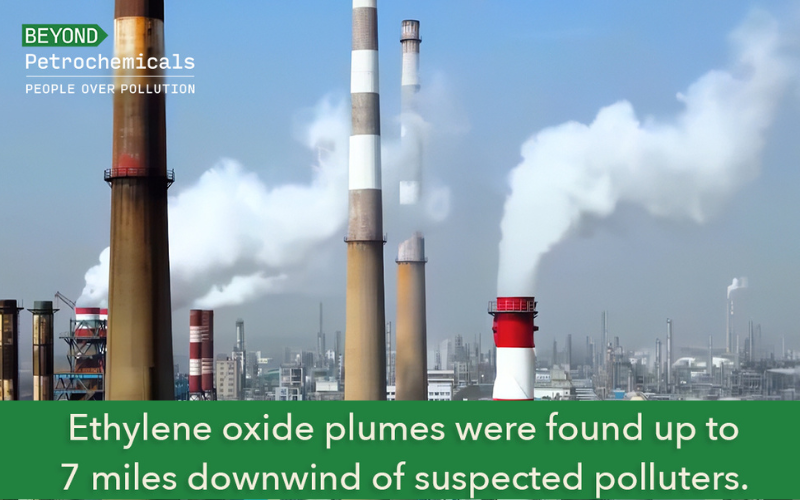
Jun 11, 2024 | DSCEJ General News, Press Releases, Research and Policy News, The Latest News
June 11, 2024 – Today, researchers at John Hopkins University issued a report of their air monitoring in Louisiana, which detected ethylene oxide (EtO) concentrations nine times higher than pollution modeling by EPA and LDEQ. This means communities are being exposed to significantly greater amounts of EtO than assumed in regulations and permitting decisions.
The air monitoring research is funded by the Beyond Petrochemicals Campaign, which is sharing the following info.
Read the Environmental Science & Technology peer-reviewed study.
View the press release
Media Contact:
Matt Smelser
512-739-9635
matt@beyondpetrochemicals.org
About Beyond Petrochemicals:
Launched by Bloomberg Philanthropies in September 2022, Beyond Petrochemicals: People Over Pollution aims to halt the rapid expansion of petrochemical and plastic pollution in the United States. The campaign draws on the success of the Beyond Coal campaign, supported by Bloomberg Philanthropies, and Bloomberg’s Beyond Carbon campaign, to turbocharge existing efforts led by frontline communities to block the rapid expansion of 120+ petrochemical projects concentrated in three target geographies – Louisiana, Texas, and the Ohio River Valley. The campaign also works to establish stricter rules for existing petrochemical plants to safeguard the health of American communities. To date, Beyond Petrochemicals has helped raise awareness and lead timely collaboration efforts using its four pillars of community leadership, data and research, legislation and litigation, and stakeholder engagement to accelerate its goals. For more information, please visit us at beyondpetrochemicals.org and follow us on Instagram, LinkedIn, Facebook, and X.
The Deep South Center for Environmental Justice is a partner organization with Beyond Petrochemicals.

May 31, 2024 | CIRC News, Community Engagement News, Dr. Beverly Wright News, DSCEJ General News, Newsletter News, Research and Policy News, Student Engagement News, The Latest News, Worker Training Program News
SPRING 2024 EDITION:
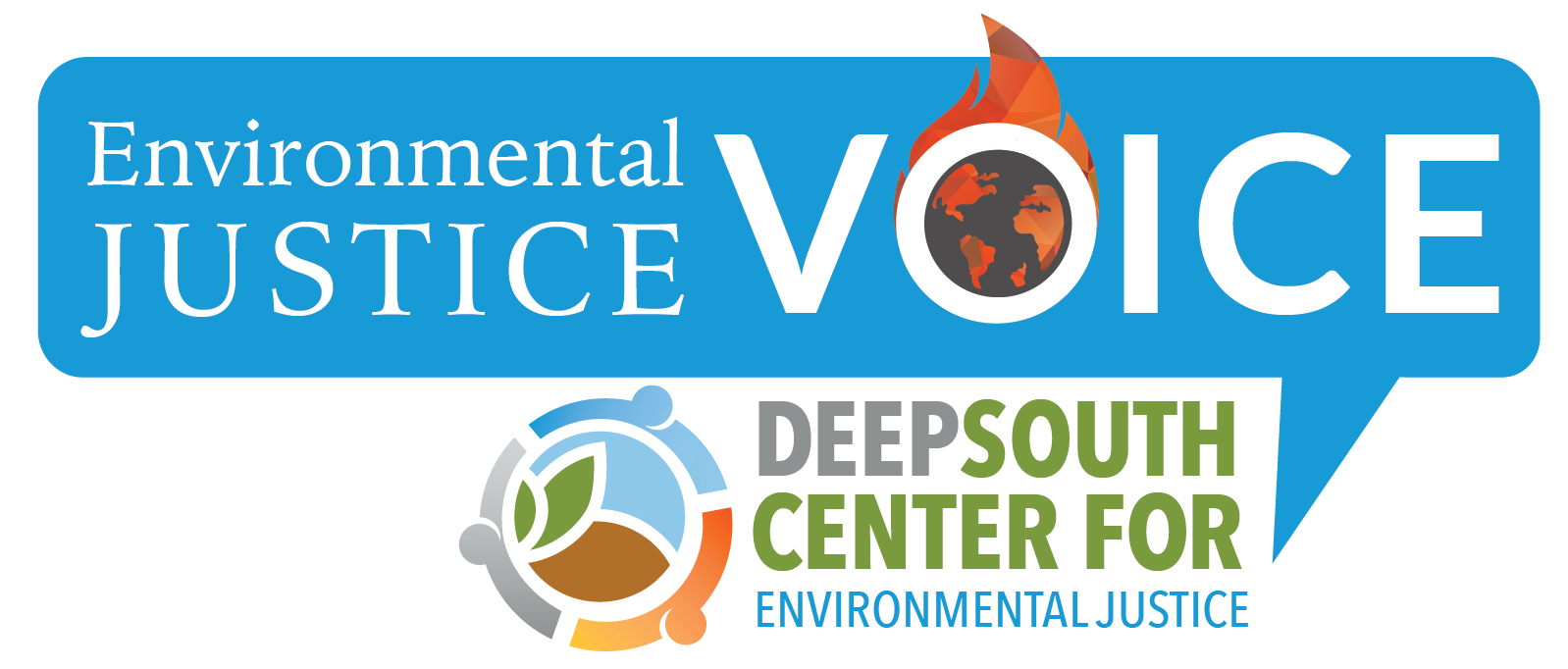
Read Our Spring Newsletter
IN THIS EDITION:
- Worker Training Program Graduation
- Justice40 – Celebrating our Success
- Community Investment Recovery Center (CIRC)
- Earth Day 2024
- Carbon Dioxide Waste Injection – Louisiana Deserves Better!
- SPRING HIGHLIGHTS
- Travelogue: Dr. Wright
- Team DSCEJ UPDATE
READ MORE . . .
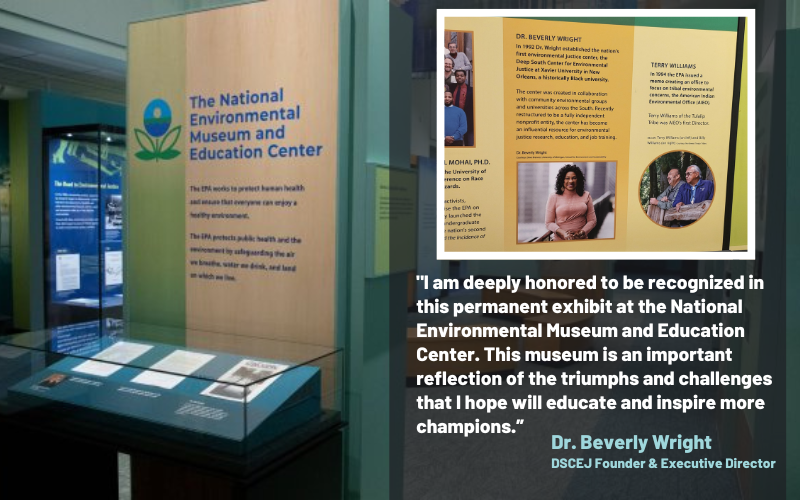
May 21, 2024 | Dr. Beverly Wright News, DSCEJ General News, Press Releases, The Latest News
NEW ORLEANS, May 21, 2024 — Dr. Beverly Wright, the founder and executive director of the longest serving environmental justice resource center, will be honored by the US Environmental Protection Agency’s National Environmental Museum and Education Center which is hosting its grand opening today in Washington, D.C.
“I am deeply honored to be recognized in this permanent exhibit at the National Environmental Museum and Education Center,” said Dr. Wright. “This museum is an important reflection of the triumphs and challenges that I hope will educate and inspire more champions.”
Dr. Beverly Wright is a scholar, advocate, author, civic leader, professor of Sociology, and the Founder and Executive Director of the Deep South Center for Environmental Justice (DSCEJ), the first-ever environmental justice center in the United States. Under the Biden administration, Dr. Wright was appointed to the White House Environmental Justice Advisory Council, where she advises on how the federal government can address current and historic environmental injustices.
Born and raised in New Orleans, Dr. Wright has experienced and witnessed the polluting effects of Cancer Alley–an 85-mile stretch of land between Baton Rouge and New Orleans that is home to over 150 petrochemical plants and refineries– her entire life. She has dedicated over three decades of her life advocating for environmental justice and tirelessly addressing the disproportionate impacts of environmental issues on marginalized communities. Wright’s work has left an indelible mark on local communities, national policies and the international EJ movement.
The National Environmental Museum and Education Center, located at EPA Headquarters in Washington, D.C., which opened in April, held its official grand opening ceremony on May 21, 2024.
To learn more about Dr. Beverly Wright, please visit https://dscej.org/beverly-wright/







